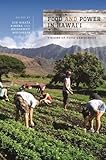Food and Power in Hawai'i : Visions of Food Democracy / ed. by Robert Ji-Song Ku, Christine R. Yano, Krisnawati Suryanata, Aya Hirata Kimura.
Material type: TextSeries: Food in Asia and the PacificPublisher: Honolulu : University of Hawaii Press, [2016]Copyright date: ©2016Description: 1 online resource (224 p.) : 10 b&w illustrationsContent type:
TextSeries: Food in Asia and the PacificPublisher: Honolulu : University of Hawaii Press, [2016]Copyright date: ©2016Description: 1 online resource (224 p.) : 10 b&w illustrationsContent type: - 9780824858537
- 9780824858612
- 664.07
- online - DeGruyter
- Issued also in print.
| Item type | Current library | Call number | URL | Status | Notes | Barcode | |
|---|---|---|---|---|---|---|---|
 eBook
eBook
|
Biblioteca "Angelicum" Pont. Univ. S.Tommaso d'Aquino Nuvola online | online - DeGruyter (Browse shelf(Opens below)) | Online access | Not for loan (Accesso limitato) | Accesso per gli utenti autorizzati / Access for authorized users | (dgr)9780824858612 |
Browsing Biblioteca "Angelicum" Pont. Univ. S.Tommaso d'Aquino shelves, Shelving location: Nuvola online Close shelf browser (Hides shelf browser)

|

|

|

|

|

|

|
||
| online - DeGruyter Islands of Protest : Japanese Literature from Okinawa / | online - DeGruyter Mothers' Darlings of the South Pacific : The Children of Indigenous Women and U.S. Servicemen, World War II / | online - DeGruyter Figures of Buddhist Modernity in Asia / | online - DeGruyter Food and Power in Hawai'i : Visions of Food Democracy / | online - DeGruyter The Charm Buyers / | online - DeGruyter Darwin, Dharma, and the Divine : Evolutionary Theory and Religion in Modern Japan / | online - DeGruyter Teika : The Life and Works of a Medieval Japanese Poet / |
Frontmatter -- Contents -- Acknowledgments -- Introduction -- 1. Tangled Roots: The Paradox of Important Agricultural Lands in Hawai'i -- 2. Food Security in Hawai'i -- 3. Kaulana O'ahu me he 'Āina Momona -- 4. Farmers' Markets in Hawai'i: A Local/Global Nexus -- 5. Is the Transgene a Grave? On the Place of Transgenic Papaya in Food Democracy in Hawai'i -- 6. Seeds of Contestation: The Emergence of Hawai'i's Seed Corn Industry -- 7. Farming on the Margin: Women Organic Farmers in Hawai'i -- 8. Labor of Meaning, Labor of Need: Organic Farm Volunteering in Hawai'i -- 9. Epilogue -- Contributors -- Index
restricted access online access with authorization star
http://purl.org/coar/access_right/c_16ec
In Food and Power in Hawai`i, island scholars and writers from backgrounds in academia, farming, and community organizations discuss new ways of looking at food policy and practices in terms of social justice and sustainability. Each of the nine essays describes Hawai`i's foodscapes and collectively makes the case that food is a focal point for public policy making, social activism, and cultural mobilization. With its rich case studies, the volume aims to further debate on the agrofood system and extends the discussion of food problems in Hawai`i. Given the island geography, high dependency on imported food has often been portrayed as the primary challenge in Hawai`i, and the traditional response has been localized food production. The book argues, however, that aspects such as differentiated access, the history of colonization, and the neoliberalized nature of the economy also need to be considered for the right transformation of our food system. The essays point out the diversity of food challenges that Hawai`i faces. They include controversies over land use policies, a gendered and racialized farming population, benefits and costs of biotechnology, stratified access to nutritious foods, as well as ensuring the economic viability of farms. Defying the reductive approach that looks only at calories or tonnage of food produced and consumed as indicators of a sound food system, Food and Power in Hawai`i shows how food problems are necessarily layered with other sociocultural and economic problems, and uses food democracy as the guiding framework. By linking the debate on food explicitly to the issues of power and democracy, each contributor seeks to reframe a discourse, previously focused on increasing the volume of locally grown food or protecting farms, into the broader objectives of social justice, ecological sustainability, and economic viability.
Issued also in print.
Mode of access: Internet via World Wide Web.
In English.
Description based on online resource; title from PDF title page (publisher's Web site, viewed 29. Jul 2021)


